- Home
- Michael P. Spradlin
Blood Riders Page 3
Blood Riders Read online
Page 3
“Hollister,” a voice called behind him.
He turned to find the duty officer; a first lieutenant named Garrick was headed his way. He figured now he’d have to make some kind of report about the fight. Whether he liked it or not, it looked like he was involved. Hollister scrambled up the ladder and came to attention, feet together and shoulders back. He made sure not to look the lieutenant in the eye when Garrick reached him. In his time in Leavenworth, Hollister had learned eye contact was a tool to be used in very specific ways: avoided with the guards and officers, used as a means of intimidation with the other prisoners.
“Sir,” he said.
“Colonel wants to see you. On the double, inmate.”
“Yes, sir.” He saluted and started for the administration building. Strangely, the lieutenant followed along. Word of Hollister’s story had made its way through the population and command structure at the prison. It had only served to isolate him because he was considered crazy. Luckily, in a place like Leavenworth, craziness was one way to stay alive: even thugs like McAfee gave him a wide berth. Yet he felt something changing. Jonas suddenly realized this shitty day had the potential to grow much worse.
“What’d you do, Hollister?” Garrick asked him. With the sun gone behind the western wall, the heat had subsided a bit and twilight shadows were racing across the grounds.
“I don’t understand, sir,” he replied.
“Like hell you don’t. You been writing letters again? You might’ve stepped in the cow shit, Hollister.”
“Yes, sir. I’m sure I did, sir,” Hollister said.
When he’d first been sentenced to prison, Hollister had used whatever meager privileges he could muster to write letters to his former comrades, commanders, and even the congressman who’d appointed him to West Point. Asking for a new trial, he had pleaded his case and begged his friends and former classmates to investigate the disappearance of his men and find the creatures that’d killed them and destroyed his life.
All for naught. He was shunned by everyone he’d once called a friend; standing up for him was a sure way out of the army. He had given up after a year.
“Colonel Whitman ain’t going to be happy, if you been stirring up the shit, inmate. You been stirring up shit again, Captain?” The lieutenant sneered. It was a grave insult to a prisoner, especially a former officer, to be referred to by his old rank. He took a deep breath, determined not to let the lieutenant draw him in to his little game.
“No, sir,” he replied quietly.
The two men crossed the main yard, reaching the wood-plank walkway leading to the main gate. Passing through, they entered the administration building with the lieutenant in the lead, climbed the stairs to the second floor, and proceeded to the colonel’s office. The lieutenant knocked on the door and they heard the gruff man answer from inside.
Lieutenant Colonel Whitman was a pompous little rooster. He was about five feet five inches tall, gray haired and clean shaven. He was approaching thirty years in the army without ever seeing combat, and as a result had never risen above his present rank, even during the war, when promotions were handed out like wooden nickels.
“That will be all, Lieutenant,” the colonel said. He was standing at the window of his office, which overlooked the yard of the main prison. Running the nation’s military prison was no plum assignment no matter how you tried to frame it. Whitman would be here until he retired or died.
“Inmate Hollister, your appearance is, as usual, appalling. You are out of uniform. I can smell you from here.” The tone in his voice was measured. These were facts, not to be disputed, and Hollister knew he would be punished for his transgressions. More digging lay ahead.
“No excuse, sir,” he said, hoping it would save him from the lecture on the importance of an inmate’s personal hygiene. The colonel remained at the window, looking out on the prison grounds. This was unusual as he normally was all business, sitting at his desk and dispensing whatever orders he needed to in a clipped and efficient manner.
The colonel’s body language made him look bound up and angry, as if he had been forced to swallow something and could not bear the taste. Hollister then noticed the other man, sitting in the corner. Medium height, thick chin whiskers and a hard, granitelike face, which implied he knew a thing or two about trouble. He sat with his legs crossed and his hands folded in his lap. Hollister noticed the rough, scarred skin on his hands, especially on a few broken fingers that had never healed right. Whoever he was, he’d been in few scraps. Hollister remained at attention and turned his eyes to the practiced middle-distance stare of a prisoner, and waited.
“You have a visitor, Inmate Hollister,” the colonel said, his back still turned to Jonas. Jonas saw Whitman’s stance go straighter as he spoke, and he clasped his hands behind him. Neither man said anything, as if waiting for Hollister to speak.
“Yes, sir,” he finally replied.
The stranger stood up, striding confidently across the creaking office floor to Hollister and stuck out his gnarled right hand.
“Captain Hollister,” he said. “My name is Allan Pinkerton.
Chapter Three
Hollister knew the name. He reluctantly shook Pinkerton’s proffered hand, but returned quickly to attention. Whitman turned around to look at him, and he was determined not to do anything that would bring the colonel’s wrath down on him. At least not yet.
“It’s a pleasure to meet you, Captain Hollister,” Pinkerton said, with a trace of a Scottish brogue.
“Private Hollister,” the colonel corrected.
Pinkerton glared at him. “For now, Colonel. For now,” he said. He stomped back to his chair, picked up a leather satchel, and placed it on Whitman’s desk.
Out of the corner of his eye, Hollister saw Whitman blanch and press his mouth into a straight line at Pinkerton’s growing list of violations of proper procedure.
“Please, Captain Hollister, at ease, at ease,” Pinkerton said as he rifled through the satchel. Jonas glanced at the colonel for approval before allowing himself to go to parade rest, his posture relaxed but on the alert. He was concerned. This wasn’t about McAfee and the fight. This was something unfamiliar. One of the most famous men in America was here to talk to him. But not knowing why made Hollister edgy.
“Yes . . . yes here it is,” Pinkerton said, pulling a small ledger out of his case and thumbing it open.
“Jonas P. Hollister, captain, United States Army. Born in Tecumseh, Michigan. Graduated from West Point in 1864, assigned to the Seventh Michigan Cavalry under the command of General George Armstrong Custer. Awarded medals for valor at Cold Harbor, Petersburg, and the Winchester Campaign. Received a field commission of lieutenant colonel directly from General Ulysses S. Grant. Court-martialed for assault on a superior officer, found not guilty but reduced in rank to captain in March 1865.” Pinkerton paused. “What exactly happened there, Captain?”
Hollister was quiet for a moment. He squinted at the man. He still didn’t know what this was about. The colonel had returned to staring out the window, giving him no indication as to how he should proceed. All right, then.
“I punched George in the face, sir, because he was responsible for the death of thirty-seven of my men.”
“When you say George, you mean General Custer?” Pinkerton asked. Hollister nodded.
“General Custer was your superior officer and you assaulted him . . .” Lieutenant Colonel Whitman said, staring in disbelief. Pinkerton held up his hand and he stopped talking.
“Go on, Captain,” Pinkerton prodded.
“General Custer, sir, was a glory-seeking jackass,” Hollister said, making sure he was speaking directly at Pinkerton. Knowing full well the colonel still held all the cards as far as his future was concerned.
“I see. What is your opinion of Custer’s performance at the Little Bighorn?” Pinkerton asked.
“I wasn’t there,” Jonas said.
“But you must have an idea. Some thought about your former c
ommander. An opinion?” Pinkerton went on.
“From what I heard and read, sir, he divided his command against a far superior enemy with a clear tactical advantage. It’s no wonder he got everyone killed. I’m just surprised it didn’t happen sooner,” Hollister stated. He saw Whitman’s shoulders tense.
Pinkerton said nothing, looking down at the ledger again.
“Tell me about Wyoming, Captain,” Pinkerton said.
“No, sir,” Hollister replied.
“God damn you, inmate, you will answer his questions,” the colonel turned from the window and roared at Jonas as he stormed around the desk.
“It’s all right, Colonel,” Pinkerton said. He had a tone about him that both shut Whitman off and took him down a peg or two. Whitman was about to say something else but decided against it, choking on the words, and spun around, returning to his spot at the window.
“I might be able to help you, Captain,” Pinkerton said
“Help me with what, sir?” Hollister asked.
“Get out of here. Permanently, I might add.”
“Is that so?”
“Yes. But I need to hear from you what happened.”
Hollister smiled. Then laughed. He wasn’t sure why he was laughing—and he saw Whitman’s face redden, which only made him laugh more. His nerves were jangled, and he felt as though he might burst if he didn’t laugh. It was the only thing he could think to do. In Leavenworth, dark humor was one of the few things that could keep you alive, and for Hollister it was all he had right now.
“Is something funny, Captain?” Pinkerton asked.
Hollister calmed himself. “Yes, sir. I’d say it borders right on hilarious. You know what happened in Wyoming. You’ve read my testimony and my regimental commander’s report on the incident. Out of nowhere, the most famous detective in America shows up at Fort Leavenworth Military Prison and asks me what happened on that ridge three years, ten months, and eleven days ago, which, I might add, I never dreamed would happen. So I’m thinking there’s only two things that could have happened. One, you’ve suddenly decided I wasn’t lying, which I doubt, since no one else has ever believed me. Or two, it’s happened again.”
Pinkerton’s eyes narrowed and he studied Hollister. Something washed over his face. It was only a flicker, but Jonas saw it, clear as day. Pinkerton had arrived at a decision. Jonas didn’t know what it might be, but he clearly had reached some determination of vital importance. Hope stirred in his chest.
“Colonel, I’d like to talk to the captain alone, please,” Pinkerton said.
“I’m afraid that’s not allowed. It’s against regulations for any prisoner to be—”
“Colonel, when I first arrived, you promised me full cooperation, did you not?” Pinkerton asked. “Here’s hoping I won’t have to send a cable to General Sherman requesting . . .”
Without another word, Whitman threw up his arms and stomped out of his office, slamming the door.
“Pompous jackass,” Pinkerton muttered. He strolled casually around the desk to Whitman’s chair and sat down. “Please, Captain, sit. Let’s talk.”
“All the same, I’d prefer to stand, sir,” Jonas said. He felt completely in the dark. He had no control over whatever was happening, and so he was determined to hold on to those things he could control. He wasn’t going to let this strange man gain any advantage if he could avoid it. At least not until he knew what was going on.
Pinkerton shrugged and turned to another page in the ledger. “Very well. You’re correct in your assumption, Captain.” He said, looking up at Jonas.
“Which assumption would that be?” Jonas asked.
Pinkerton let out a big sigh. “Captain, I can assure you, I am here as your advocate. However, if you can’t at least listen to what I have to say with an open mind, we’re not going to get very far.”
Jonas said nothing for a moment. “Pinkerton.” He paused, thinking. “Weren’t you in charge of President Lincoln’s security?”
“I was,” Pinkerton replied.
“That sure worked out well,” he said.
Pinkerton’s eyes clouded and Jonas watched as the man’s mouth straightened into a thin line. His color changed from pale to bright red and Jonas set his feet, half expecting the detective to launch himself over the desk and pummel him into the floor. Yet the fury subsided as quickly as it had risen, and Pinkerton composed himself, settling in the chair again.
“As I said, Captain, you are correct. We’ve had another incident, similar in details to what happened to your command in Wyoming. In this case it was a mining camp in Colorado. One man escaped and reported an assault on the camp by what he called ‘flesh eaters.’ When the creatures attacked, the man jumped across the stream where the sluice box was set up. For some reason they didn’t pursue him there. They didn’t want to or for some reason weren’t able to cross the stream. The rest of his camp was wiped out. Each man was killed and the bodies were then thrown in the back of a wagon and carted away. Does this sound at all familiar, Captain?” Pinkerton looked up over the eyeglasses perched on the end of his nose.
Hollister nodded. He began to sweat, feeling the heat of the rising sun on that Wyoming ridge, watching in horror as the bodies of his troopers were casually tossed into a wagon like sacks of grain.
“The flesh eaters, as the man called them, rode away just before sunrise. This lone survivor finally made it into town and led a posse to the scene. As I’m sure you can guess, there was nothing to see. No bodies, some blood on the ground, a few signs of a struggle, but nothing else to support the man’s story.”
“Excuse me, Mr. Pinkerton, but why are you here? What makes somebody with your connections come all the way to Fort Leavenworth to tell me this?” Jonas asked.
“Because, Captain Hollister, things have changed. Your experience in Wyoming is being looked at in a new light.”
“Is that so?” Hollister asked quietly.
“Yes. In fact, Captain Hollister, we have a proposal for you. Something we think you are uniquely qualified for,” Pinkerton said.
“What might that be?” Jonas asked.
“To find these things. Whatever they are. And kill them.”
Chapter Four
Hollister was back in the colonel’s office two hours later, bathed, clean shaven, and in a fresh uniform. He tried not to notice the fact that the blue blouse showed captain’s bars at the neck, but his fingers went to them and touched them unconsciously. Pinkerton was still there, in Whitman’s chair, and he held out a sheaf of papers.
“Just a few formalities and we’ll be on our way, Captain. I’ll need you to sign a few documents, after that we’ll board a train for Denver. My private car is waiting at the station in town,” Pinkerton said.
He dipped a pen in the inkwell on the colonel’s desk and held it out for Jonas.
Jonas stood, hands clasped behind his back. Not moving and making no effort to take the pen. Pinkerton, head down as he shuffled through the papers on his desk, finally looked up.
“Is there a problem, Captain?” he asked.
Jonas nodded. “I expect there is.”
“Would you care to elaborate?”
Jonas stuck out his arm and rubbed the clean, fresh cloth of his new uniform.
“Certainly, Mr. Pinkerton. I’d be happy to. There’s too much going on here that I don’t understand. First question: you say what happened to my men in Wyoming has happened again in Colorado. I don’t see how that affects me. No one believed me then, so why all of a sudden is my story accepted as the truth?”
Pinkerton was about to answer, then thought better of it. He sat back, staring at Hollister, waiting for him to finish.
“Second question: after why me, why you? You are not unknown to me. You are famous and connected. So why are you here?”
“When this is over, I’d like you to consider working for me as a detective. You have a keen mind, Captain.” Pinkerton smiled.
“Not according to the United States Army, Mr.
Pinkerton.”
Pinkerton waved a dismissive hand. “Yes. Well. Admittedly, mistakes were made. We know it now. We’d like make it up to you, but we’d also like your help.”
“And if I refuse?” Jonas asked.
Pinkerton frowned. “I’m afraid you’ll remain here and finish out your sentence.”
“Ah,” Jonas replied. “So that’s it. You’re not really exonerating me. You’re asking me to take on a duty that will most likely get me and perhaps others killed. And if I refuse, I stay here digging Whitman’s dirt until my sentence is up.”
“I wouldn’t put it in quite those terms, but yes.” He picked up the paper he’d wanted Hollister to sign. “It’s all laid out here in writing. If you accept reinstatement you’ll be assigned to a special detail of the U.S. Secret Service and report directly to me. You’ll be paid, outfitted, and to assure the army’s cooperation whenever you need it, you’ll be restored to your rank. You’ll have authority from General Sherman to use whatever facilities or troops you deem necessary to expose and eradicate this threat.”
“Paid, you say. How much?” Hollister asked.
“Two hundred fifty dollars a month, plus board and horses. You’ll also be given access to a private, specially outfitted train.”
The amount of money stunned Jonas. It was nearly quadruple what his army pay had been before he was sent up the river. However, if he found these “flesh eaters,” he’d most likely get himself killed and he’d never spend the money anyway.
Jonas paced. Pinkerton waited patiently.
“Still doesn’t answer my second question, sir. Why now? Why does anyone believe me?” Hollister asked.
Pinkerton rested his elbows on the desk. He suddenly looked tired.
“The man who survived this most recent attack is from a family of some consequence. He has made noise. This noise has reached the president.”
“Who is this family?”
“Their name is Declan,” Pinkerton reluctantly answered.

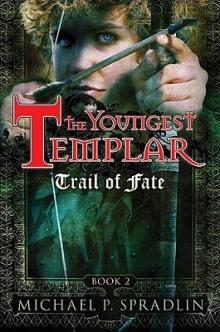 Trail of Fate
Trail of Fate Alcatraz
Alcatraz Every Zombie Eats Somebody Sometime
Every Zombie Eats Somebody Sometime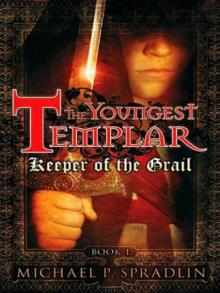 Keeper of the Grail tyt-1
Keeper of the Grail tyt-1 To Hawaii, with Love
To Hawaii, with Love Out for Blood
Out for Blood The Spy Who Totally Had a Crush on Me
The Spy Who Totally Had a Crush on Me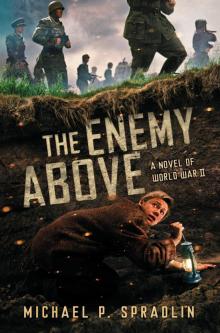 The Enemy Above
The Enemy Above Menace From the Deep
Menace From the Deep It's Beginning to Look a Lot Like Zombies
It's Beginning to Look a Lot Like Zombies Feeding Frenzy
Feeding Frenzy 3 The Spy Who Totally Had a Crush on Me
3 The Spy Who Totally Had a Crush on Me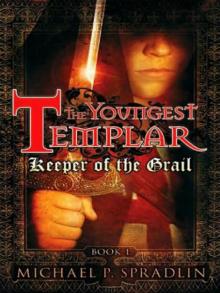 Keeper of the Grail
Keeper of the Grail Prisoner of War
Prisoner of War Jack and Jill Went Up to Kill
Jack and Jill Went Up to Kill Live and Let Shop
Live and Let Shop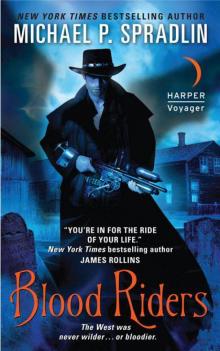 Blood Riders
Blood Riders Ultimate Attack
Ultimate Attack